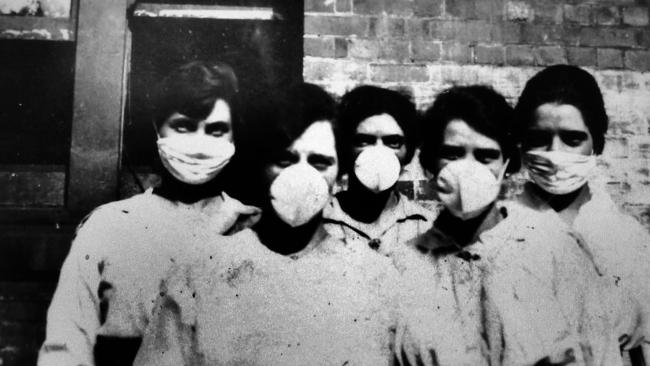David Penberthy: Are senseless platitudes our most irritating pandemic habit?
Historically inaccurate generalisations, life being described as “the new normal”, and celebrities saying they’re with us. This is surely the worst of our COVID-19 experience, writes David Penberthy.
Rendezview
Don't miss out on the headlines from Rendezview. Followed categories will be added to My News.
Aside from home schooling, toilet roll hoarding and the closure of my local pub, one of the most irritating features of the past few months has been the explosion in platitudes and historically inaccurate generalisations to describe the experience of living through a pandemic.
I don’t know about you but the next time a celebrity tells me “we’re all in this together”, I’m going to put my foot through my Microsoft Teams screen.
In his superbly-titled writing guide Cliches: Avoid Them Like the Plague, journalist Nigel Fountain takes aim at the many clapped-out constructions that clutter and debase the English language.
Fountain’s argument is that with so many thousands of words at our disposal it takes a special brand of laziness to shuffle them around like magnets in their unimaginative, prepackaged form.
During this current plague, cliches, to use a cliche, have reached plague-like proportions, some coming with the added bonus of being factually wrong.
Cliche number one on the list of shame is the word “unprecedented”. The constant and inaccurate use of this word says a fair bit about the modern ambivalence toward possessing any real knowledge of history.

Many people – some of them journalists – clearly believe that unprecedented means “something I can’t remember happening” or “something I never learned about”. The truth is that the 2020 coronavirus pandemic is quite easily one of the most precedented events the world has ever seen.
It is only unprecedented if you’ve never heard of the Black Death, the Plague of Athens, the Spanish flu, the Ebola virus, polio, SARS, MERS, swine flu and AIDS.
Not all of these nasties reached pandemic status, but on their early estimates they did threaten to kill us all, demonstrating that if you think the threat of imminent death at the hands of a virus is a novelty, you should put on your face mask and get out more.
Cliche number two is “the new normal.” A great name for a band, sure – in fact I reckon I saw The New Normal supporting The Models at the Toucan Club in 1985. But “the new normal” has very quickly become a hackneyed way to describe changes in behaviour which are hopefully only temporary, and often quite minor.
To use a really cool word, “the new normal” has the effect of catastrophising every element of the pandemic response, whereby the need to use hand sanitiser when entering the local supermarket, or not cough at will on public transport, is held up as a major, life-altering development that proves our past assumptions about the nature of existence have been ripped from beneath us.

In the world of advertising, no self-respecting copywriter can even think about writing a script at the moment without the tiresome and predictable use of Zoom and Microsoft Teams visuals to labour the point (as if we need reminding) that we are working and socialising remotely, and to set it all up with some hangdog, melancholy preamble about the taxing nature of life under lockdown.
Feel free to insert your own adjective here, folks: In these troubled times, in these uncertain times, in these testing times, in these anxious times, in these challenging times, in these difficult times.
It’s like a depressing version of the game Mad Libs, but you can make it vaguely entertaining by inserting a random and inappropriate adjective, e.g. in these dead sexy times, in these inflatable times, in these bat-flavoured times.
In these troubled times, we are also seeing a rise in non sequiturs, statements that do not follow on logically from themselves, where there’s some random coronavirus reference in advertisements that actually have nothing to do with the pandemic.
I saw an ad on TV the other night for a store selling blinds and curtains. The opening line of the commercial said the coronavirus had changed everything and that their blinds and curtains were now 30 per cent off.
Is there a causal link there? Are the blinds cheaper because of the coronavirus? Is this what chaos theory means – man in China eats pangolin, blinds and curtains, out they go!
Or in these troubled/testing/uncertain times, are we all just safer during the lockdown if we keep the curtains drawn?

The annoying sibling to the “trouble times” construct is the assertion that “Now, more than ever…”, as in: Now, more than ever, your dog needs a certain brand of dog food, your parents need you to call them, your lawn needs to be scarified.
It might have something to do with the closure of my local pub but now, more than ever, in these challenging times, I’ve had enough.
And by the length of the straight, the most irritating of all is the one I referenced at the start. We are all in this together. It’s as if an official edict was sent out at the start of the lockdown telling every celebrity in Australia that they would have their contracts shredded unless they agreed to be filmed at home in Zoom format wearing Peter Alexander pyjamas, holding a mug of cocoa and sporting deliberately-mussed hair, in keeping with the stylings of iso-chic, before turning wistfully to the camera and saying: We’re all in this together. And don’t forget to cue that infernal jingle.
The question I’ve got is, how? How I am in this with, say, Karl Stefanovic? Is he lurking in the study here somewhere as I write this? How did he even get my address? I knew I shouldn’t have downloaded that COVID app.
As with the great band Spinal Tap – who briefly played as The Originals, only to change their new to The New Originals when they learned of another band called The Originals – the new normal will hopefully soon just become normal, and we can all get back to talking normally again.

